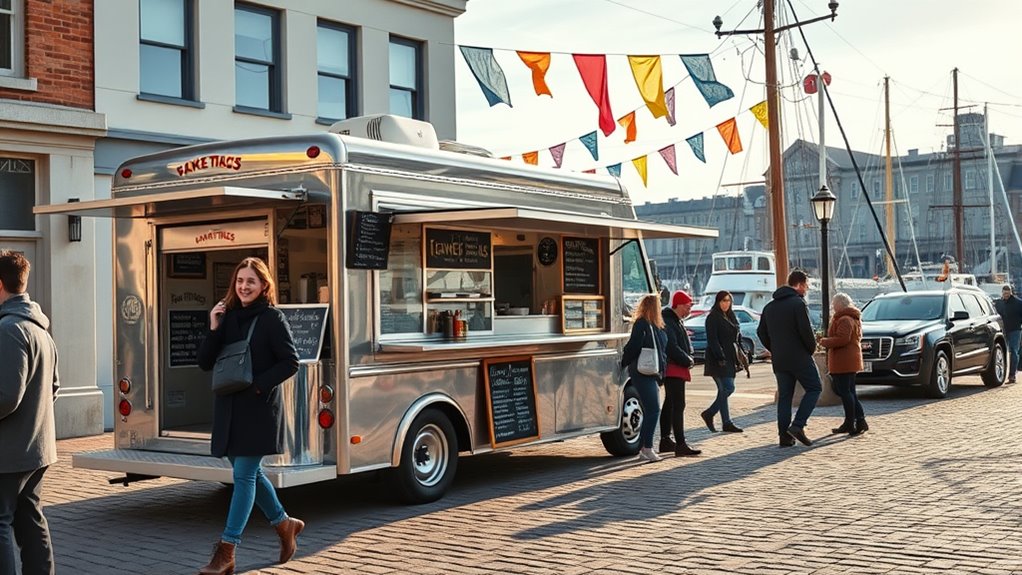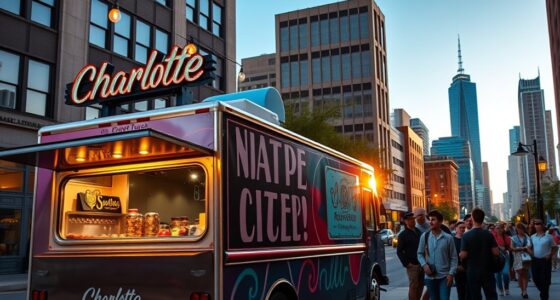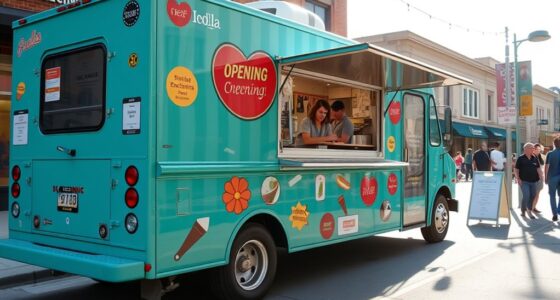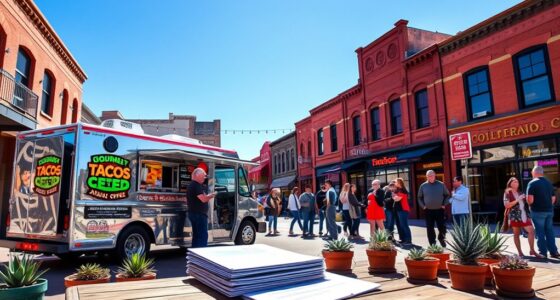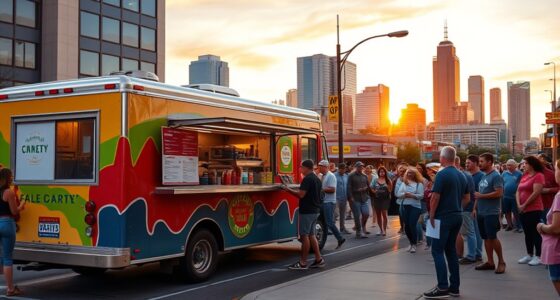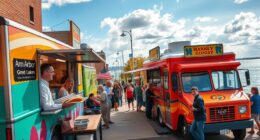To open a food truck in Portland, Maine, you’ll need permits like a Mobile Food Service Establishment license ($546) and a Mobile Vendor License ($20), along with zoning, health, and safety approvals. Expect startup costs between $40,000 and $150,000, depending on your truck choice, plus ongoing expenses. Focus on high-traffic locations, craft a menu with local favorites, and promote via social media and events. Continue exploring to discover the full steps to launch your food truck success.
Key Takeaways
- Obtain required permits including Mobile Food Service Establishment and Vendor Licenses, and secure zoning, health, and transportation approvals.
- Startup costs vary from $40,000 to $250,000, covering vehicle, equipment, permits, inventory, and marketing.
- Choose high foot traffic locations with vehicle access, ensuring compliance with parking laws and proximity rules.
- Develop a menu featuring Maine-inspired ingredients and safe, pre-packaged foods suitable for truck preparation.
- Utilize social media, participate in local events, and implement loyalty programs to effectively market your food truck.
Navigating Permits and Licensing Requirements in Portland
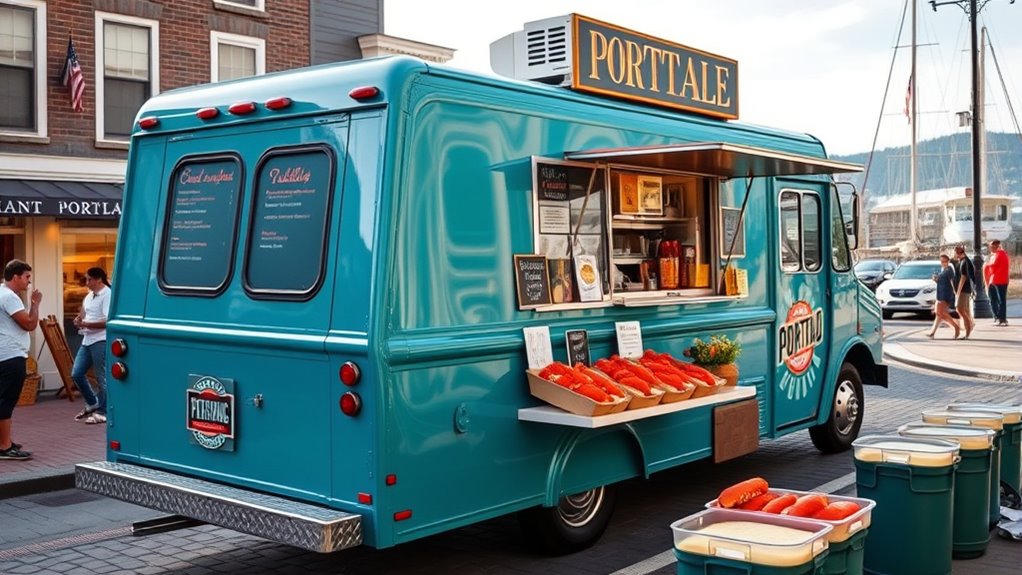
Finding permits and licensing requirements in Portland can seem complex, but understanding the key steps helps guarantee your food truck operation complies with local regulations. First, you’ll need a Mobile Food Service Establishment license, which costs $546 and expires each March 31. If you plan to sell prepared or packaged foods off-premise, you’ll also need a $20 Mobile Vendor License from the Maine Department of Agriculture, Conservation and Forestry. Whether operating on private property or public right-of-way, you must secure zoning and transportation approvals. Additionally, health department approval is essential; you’ll need inspections from the Multnomah County Health Department or state health inspectors. Don’t forget to obtain any necessary electrical, plumbing, or signage permits if your truck has fixed equipment or displays. Following these steps ensures your food truck stays compliant. Furthermore, obtaining federal licensing, such as an EIN from the IRS, may be necessary for tax purposes and employee payroll. It’s also helpful to stay informed about industry trends that could impact your licensing requirements or operational standards.
Estimating Costs to Launch Your Food Truck Business
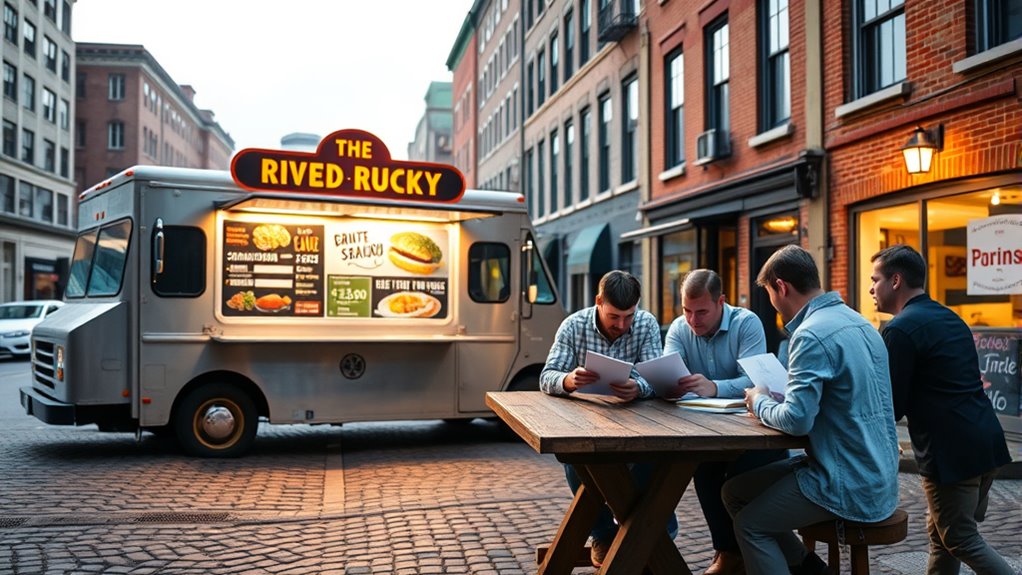
Launching your food truck business involves understanding the various costs you’ll face upfront. You’ll need to budget for your vehicle, equipment, permits, inventory, staff, and marketing. A used truck in 2025 can cost between $40,000 and $80,000, while new custom-built trucks range from $75,000 to $150,000, or up to $250,000 fully equipped. Leasing is an option at $2,000–$3,000 monthly. Permits and licenses typically cost around $1,864, though this varies by city. Initial inventory expenses span $1,000–$5,000, with ongoing costs for supplies and ingredients. Staff wages, fuel, maintenance, and marketing add to your expenses. Here’s a quick overview:
| Cost Category | Estimated Range |
|---|---|
| Vehicle & Equipment | $40,000 – $250,000 |
| Permits & Licenses | ~$1,864 – $28,276 |
| Startup Inventory & Supplies | $1,000 – $5,000 |
Finding the Ideal Spots to Operate Your Food Truck
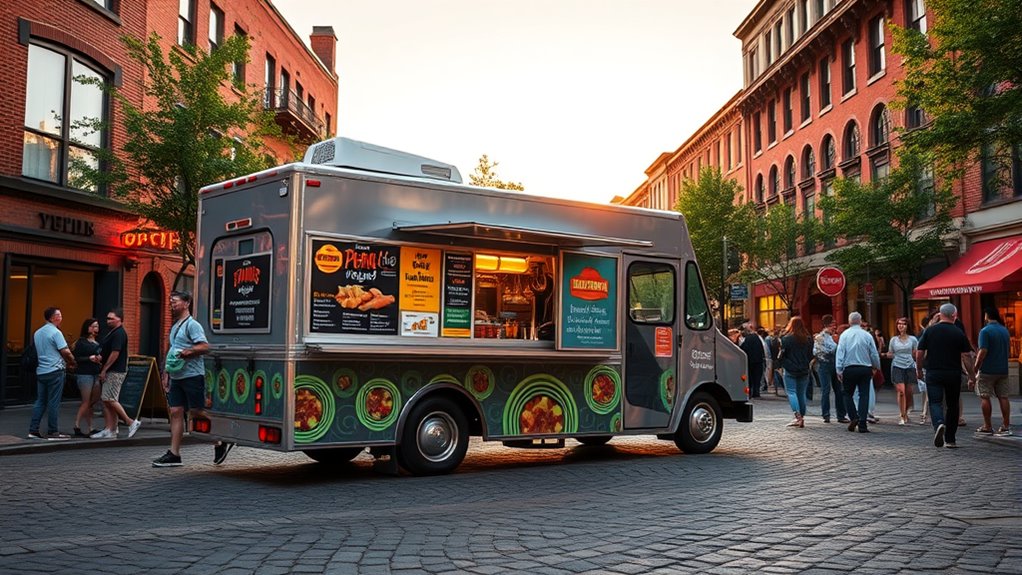
Choosing the right location is essential to your food truck’s success in Portland, Maine. Focus on high foot traffic spots like parking lots near parks and waterfronts to maximize sales. Make sure to park in the approved middle lot on Cutter Street, avoiding Eastern Promenade roadway since June 2022. Keep a minimum of 65 feet from commercial restaurants and lodging to meet city rules. Select spots with easy vehicle access that fit size restrictions—no more than 10 feet wide and 24 feet long—and ensure your truck doesn’t block pedestrian flow. Limit parking at a single location to 30 minutes when not operating. For special events, obtain proper permissions and follow safety guidelines, always respecting parking laws and proximity restrictions. Additionally, understanding zoning laws can help you identify permissible locations for your food truck and avoid potential legal issues.
Crafting a Menu That Appeals to Local Tastes and Ensures Safety
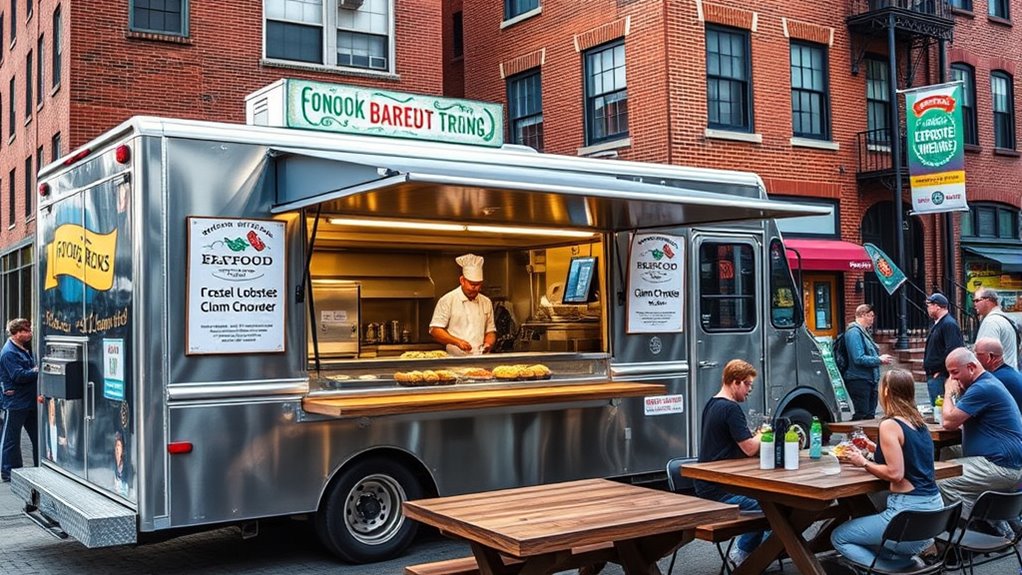
To create a menu that resonates with Portland’s local tastes and meets safety standards, you need to balance regional flavors with proper food handling practices. Incorporate popular local ingredients like lobster, clams, and seasonal produce to attract customers. Including comfort foods with a Maine twist, such as lobster rolls and clam chowder, helps build a loyal following. To guarantee safety and efficiency, focus on these key points:
- Limit menu items to those that can be prepared safely within your truck’s equipment and space.
- Avoid raw potentially hazardous foods unless you have proper refrigeration and sinks.
- Use pre-packaged or prepared ingredients from licensed facilities to simplify safety compliance.
Proper planning and regulatory adherence ensure that your menu can be both appealing and compliant with health and safety standards, reducing the risk of future issues. Additionally, understanding the food safety standards relevant to mobile food operations can help you maintain compliance and protect your customers.
Effective Marketing Strategies for Food Truck Success
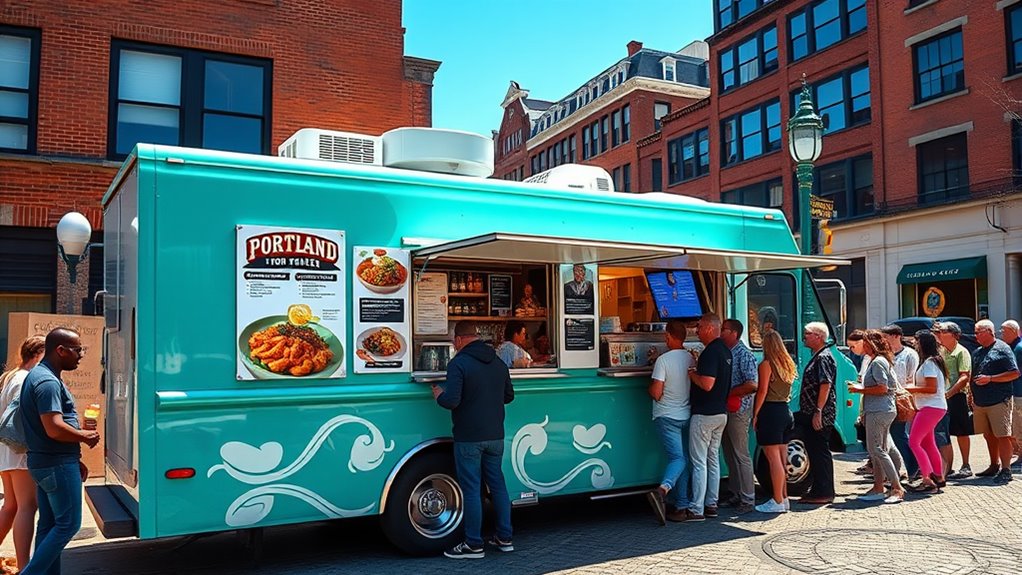
Effective marketing is essential to standing out in Portland’s competitive food truck scene. Leveraging social media platforms is a proven strategy; 68% of food truck owners promote regularly, with Facebook being the top choice, used by 75%. Social media campaigns can boost sales by 20%, and 40% of customers discover trucks through ads. Active social media engagement also encourages customers to spend about 15% more. Participating in festivals and community events increases visibility and foot traffic, with about 80% of trucks attending at least three annually. Building loyalty through programs and direct communication, like email lists and personalized offers, increases repeat visits by 30%. Using GPS apps and data analytics further refines your marketing, helping you reach the right audience and grow your business effectively. Digital tools such as review platforms and analytics enable better customer targeting and feedback management, enhancing overall marketing efforts. Additionally, understanding pimple patch trends and consumer preferences can inform your marketing messages to appeal to health-conscious customers seeking quick skincare solutions.
Frequently Asked Questions
Are There Specific Insurance Requirements for Food Truck Operators in Portland?
You need to meet Maine’s insurance requirements for food trucks in Portland. This includes carrying commercial auto insurance with at least $50,000 per person and $100,000 per accident for bodily injury, along with general liability coverage. If you serve alcohol, liquor liability is essential. Also, guarantee workers’ compensation is in place if you have employees. These coverages protect you from legal and financial risks specific to operating a mobile food business.
How Do Parking Restrictions Impact Food Truck Operations in Portland?
Parking restrictions in Portland considerably impact your food truck operations. You need to park only in approved, legally established areas, which limits your available spots. These restrictions also dictate operating hours and proximity to restaurants, often requiring strategic planning for parking locations. Temporary event restrictions further reduce options. To stay compliant, you’ll have to coordinate permits carefully, adapt your site choices, and adjust your marketing efforts to maximize customer access within these limitations.
Can I Operate My Food Truck Year-Round in Portland’S Climate?
You can operate your food truck year-round in Portland’s climate, but you’ll face challenges during winter months. Cold, snow, and icy roads require specialized equipment like winter tires, insulation, and heating systems. Adapt your menu to include hot, comforting options and plan for shorter hours or pop-up locations. With proper maintenance, winter-specific permits, and smart marketing, you can keep your business running despite Portland’s seasonal weather.
What Are the Best Practices for Waste Disposal and Recycling?
You should follow best practices for waste disposal and recycling by installing grease interceptors to manage FOG, ensuring wastewater connects properly to city standards, and avoiding aboveground graywater storage. Always provide covered, screened dumpsters away from streets, and keep waste areas tidy. Use segregated recycling and compost bins, and maintain your liquid waste tanks according to health codes. Proper disposal prevents penalties, protects the environment, and keeps your operation compliant and sustainable.
Are There Restrictions on Music or Entertainment on Food Trucks?
Imagine your food truck as a stage — but are there curtains you need to abide by? In Portland, Maine, restrictions on music and entertainment exist, especially if amplified sound is involved. You’ll likely need a separate permit for live music or dancing, and noise ordinances may limit volume and hours. Always check with local authorities to confirm your entertainment doesn’t steal the show — or get you shut down.
Conclusion
Starting your food truck in Portland is like stepping into a bustling marketplace from a bygone era—think Victorian fairgrounds with modern flair. By securing the right permits, budgeting wisely, choosing prime locations, crafting a tasty menu, and marketing smartly, you’re set to thrive. Keep your eye on the prize, stay adaptable, and remember, every great journey begins with a single step—just like the pioneers of yesteryear. Your food truck adventure awaits!
